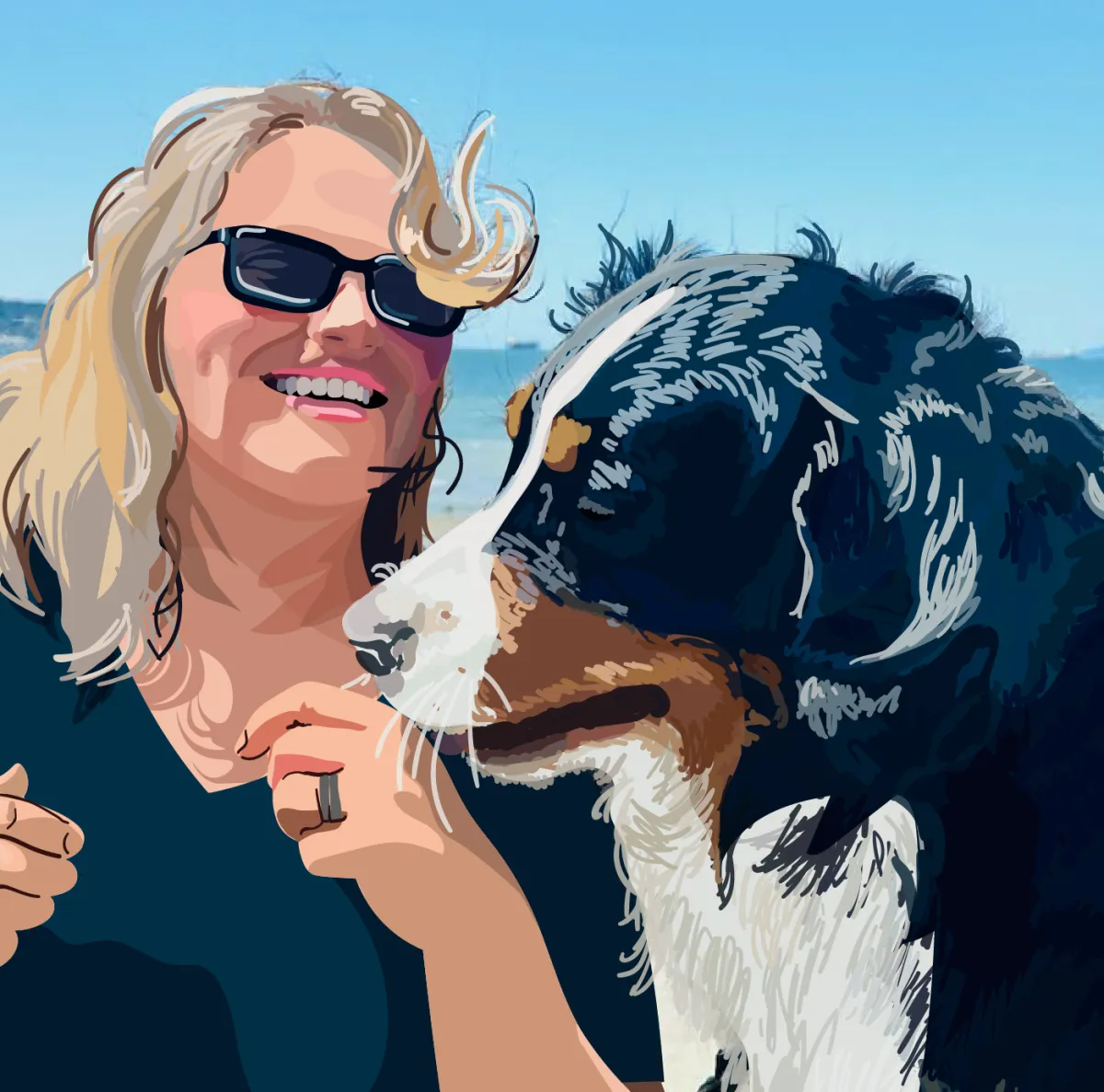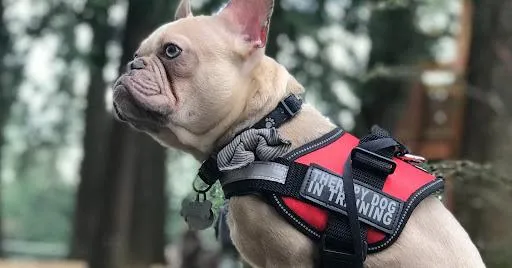

About Us
Since 2011, we’ve combined formal education in psychology, veterinary care, and canine cognition to provide exceptional dog training.
Dedicated to the humane and ethical treatment of our best friends, we rely on the latest research, while ensuring that our work is rooted in 15,000 years of human-dog connection.
Dogs and humans have evolved together for 20,000 years. They have found food for us, and protected our families and livestock. They have gone to war with us and acted as gentle playmates for our children. They have laid down their lives to save us.
Our lifestyles have changed a lot in the last century, but our need for dogs hasn't. A dog and their owner, when reunited, sync their heart rates within minutes. Just owning a dog decreases heart attack mortality by 30%.
We are designed to live with dogs, but we need to learn how to incorporate them into our chaotic modern lives.
We're here to help you and your dog learn how to live together in these modern times.
Forget sit and stay!
At Wag The Dog we can teach dogs to:
Find our phones and keys when we lose them.
Find our children when we lose them!
Put recycling in the blue bin.
Fetch their own leash for walks.
Close doors and cupboards.
Imitate our actions.
Communicate their needs and thoughts clearly.
Recognize fragile people like children and the elderly and be cautious around them.
Accompany us on outings and errands.
Trust us to return home to them when we go out.
Understand simple phrases and two step instructions.

Carol Millman (she/her)
- Lower Mainland
B.Sc, Psychology, Veterinary Technologist, Certified Pet Dog Trainer - Knowledge Assessed (2022), Certified Trick Dog Instructor
Carol lives in Port Coquitlam and works in the Lower Mainland. Her autism gives her a unique perspective which she brings to her work with both dogs and people. Her time working as a veterinary nurse culminated in becoming the Director of Medical Services at a holistic veterinary clinic.
In 2008, Carol was hired as an apprentice Advanced Instructor at Pacific Assistance Dogs Society (PADS). She trained and placed wheelchair assistance dogs, hearing dogs for the Deaf, and facility therapy dogs. She also ran puppy classes and assisted in the daily care of the dogs in training.
Carol is now the Director of Training at Heeling Assistants Canada, and still helps pet dogs through Wag The Dog.

- Currently On Leave -
Amelia Kellum (she/her) - Fraser Valley
B.Sc Canine Studies, Certified Professional Dog Trainer Knowledge/Skills Assessed (2022), Certified Trick Dog Instructor.
Amelia is a certified professional dog trainer with nearly two decades of experience training dogs - including hunting, acting, and assistance dogs such as hearing, therapy, guide, and mobility dogs.
Amelia has learned directly from Bonnie Bergin, pioneer of the disability assistance dog, and is also a graduate of the Ben Kersen and the Wonderdogs professional trainer's program.
She apprenticed at PADS as an instructor and has been training independently since 2010. She now lives in Hope with her family.
What can you achieve
with our help?
Come check out our blog!

Service Dogs, Therapy Dogs, and ESAs: ... These Are Not The Same Things.
Therapy Dogs, Service Dogs and ESAs are NOT the same thing!
One of the more difficult aspects of our job is trying to identify what people mean when they call us and say they want their dog "certified as a therapy dog" or that they want to train their dog as an "emotional support dog".
Sometimes when people say this, they really mean:
"I want my own dog certified as a psychiatric service dog for myself or a family member."
Other times, they mean:
"I want my own dog certified as a facility therapy dog for a school or nursing home."
And sometimes they mean:
"I want my untrained dog to be certified as "in training" so my landlord can't evict me."
I'd like to help clear up the confusion around these three statements.
Therapy Dogs Help Other People

Therapy dogs provide Animal Assisted Therapy to those who can benefit from it. A Therapy Dog may work in a senior care residence, a children's hospital ward, a court house, a psychologist's office, or a school counsellor's office.
Therapy dogs do not have public access rights, nor do they need them. The facility they work in, be it a school or nursing home or private office, gives them permission to enter because they are - in essence - an employee.
They do not have the right to walk into locations where they have not been invited.
Service Dogs Assist Their Handler

A psychiatric service dog provides Animal Assisted Therapy to only one person - their handler, who suffers from emotional, neurological, or psychiatric challenges such as PTSD, Autism, or Schizophrenia.
As well as providing a comforting friend in challenging situations, these dogs are trained to assist in others ways.
They may give medication reminders, help their owners avoid triggers, interrupt self-harm, alert their owners to rising cortisol levels, or warn their owner of an oncoming hallucination.
Psychiatric service dogs are considered disability equipment and their handlers have the right to bring them into public places which do not permit pet dogs, IF (I'm putting this in bold):
They do not cause public disturbance and behave calmly and appropriately.
Emotional Support Dogs Are Dogs
Dogs love us unconditionally. Dogs lower our heart rates, lower our cortisol levels, and lower our blood pressure. They increase our chance of surviving a heart attack.
All dogs have value as companions and best friends.
Sadly, they cannot accompany us in public places unless those places permit pets.
Personally, I'm of the opinion that a well behaved pet that causes no problems should be welcome everywhere.
Unfortunately, I don't own "everywhere" and the owners of stores and medical offices have the right to make their own rules about such things.
The term "Emotional Support Animal" is an American term, and does not have an equivalent in Canada.
In Canada, either you have a very well trained dog who assists you with your disability, or you have a beloved pet which must abide by normal rules. There is no "emotional support dog" designation and you cannot get your pet "certified" as such, despite what scam websites may tell you.
Having a disability, including one like PTSD, is not sufficient to give you the legal right to bring your beloved pet into public in British Columbia.
The dog must meet certain criteria, in which case it becomes a service dog, not an ESA.
Practice Time!
Let's look at some imaginary dogs and their jobs, and categorize them.
This is Bosco.
Bosco's owner is a paramedic.
Bosco comforts worried family members and trauma victims on ambulance rides.
Bosco is well trained and obedient, and always relaxed in new situations.
Is Bosco a Therapy Dog, Emotional Support Dog, or Service Dog?
Answer: Therapy Dog
This is Salty.
Salty's guardian has PTSD and feels safer when Salty is with him.
Salty has no special training, though he's generally well behaved.
He does tend to sniff around in stores or wags his tail and approaches people who talk to him.
Is Salty a Therapy Dog, Emotional Support Dog, or Service Dog?
A: Emotional Support Dog - legally, a pet.
This is Tater.
Tater's guardian has generalized anxiety.
Tater reminds her to take her medications, and jumps on her and starts licking her face when she has a panic attack.
Tater heels on a loose leash in stores and lies under tables at restaurants.
Is Tater a Therapy Dog, Emotional Support Dog, or Service Dog?
Answer: Service Dog.
This is Sunny.
Sunny's guardian suffers from Schizophrenia.
Sunny has a remarkable ability to recognize an oncoming hallucination.
Sunny is only eight months old and still sometimes jumps on people who walk by.
Therapy Dog, Emotional Support Dog, or Service Dog?
Answer: Potential future service dog, but needs training, so for now, a useful pet.
Interested in your dog becoming more than an ESA?
Learn more about our service dog program here.

We work on land which was taken from the nations who had lived here for thousands of years. They are still here and they are still waiting patiently for us to stop being jerks about it.
© 2024 Copyright Wag The Dog Training
All Rights Reserved




